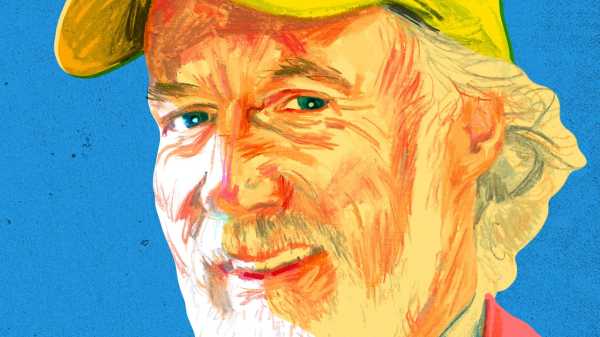
Allan Gurganus and I grew up, thirty years apart, in the small town of Rocky Mount, situated on the Tar River in eastern North Carolina. A life-size portrait of Gurganus hung in our local library’s entryway, and I used to leaf through a copy of his best-known novel, “Oldest Living Confederate Widow Tells All,” while waiting for my piano lessons to start. (Gurganus knew my music teacher, Gene Featherstone, socially. “A sweetheart,” he assured me.) For me, Gurganus was proof that you could come from the place where I lived—a place steeped in propriety, religion, and tradition—and become a writer.
After high school, Gurganus studied painting at the University of Pennsylvania and the Pennsylvania Academy of the Fine Arts, but he dropped out, and, with the Vietnam War on, became eligible for the draft. He ended up an enlisted man, assigned to the U.S.S. Yorktown. After three years of service, he went to Sarah Lawrence, and studied with Grace Paley, and then to the Iowa Writers’ Workshop, where his teachers included Stanley Elkin and John Cheever. Cheever sent one of Gurganus’s stories, “Minor Heroism,” to The New Yorker, which published it, in 1974, when Gurganus was twenty-six. It has been described as the magazine’s first work of fiction to feature a gay character.
Gurganus moved to Manhattan in 1979. “Oldest Living Confederate Widow Tells All,” which is narrated by a ninety-nine-year-old woman who married a veteran of the Civil War when she was fourteen, was published ten years later. It sold more than four million copies and remained on the Times’ best-seller list for eight months. Gurganus’s work is socially incisive, tender, and erotic; race, sexuality, Southern masculinity, and the Church continually engage him. Le Monde called him “a Mark Twain for our age, hilariously clear-eyed, blessed with perfect pitch.”
He spent fifteen years in New York. During the AIDS epidemic, he lost friends and lovers, many of whom he remembers in his second novel, “Plays Well with Others.” He has also published a novella and three collections of stories. About thirty years ago, he returned to North Carolina, moving into a home in the historic district of Hillsborough. When my first book came out, he sat in the front row at a reading in Chapel Hill, and invited me and my two children to visit his house. Recently, I went to see him there again. It is a convention of treasures: William Morris wallpaper, ancestral oil paintings, stained-glass windows sourced from a demolished Gothic church, and a portrait that once hung in the actress Cécile Sorel’s Paris apartment. We spent two days together, and later I called him on the phone and we talked some more. Our conversations have been edited for length and clarity.
Your house is extraordinary. The aesthetic feels entirely your own.
People either get it or they run. I love beautiful things, I love ugly things, and what mixes the two is what I love best. As a child, I always imagined myself having a house like this—a house made of playrooms. No one can tell me not to paint in the kitchen. Now I have a live-in helper, and I see him and his cats experiencing the space as a new form of freedom.
What brought you to Hillsborough?
I guess Hillsborough did. I left New York City after a funeral. My last lover-slash-friend, who’d been suffering from AIDS, died at thirty-two. At his burial, I looked back at the city in the distance. I thought, Now I don’t have anything to do this afternoon. This is the end of the line. Everyone I’d been taking care of had died. I saw my opportunity to get out. It was a relief to feel that it was over.
North Carolina was the only place I could think of—it was an automatic setting. I knew what bloomed and what I could and couldn’t expect from nature. It was almost as if I was being assisted by some of the forces I had lost to the pandemic.
Chapel Hill was too expensive. I needed a fixer-upper, another patient but one that could be resuscitated. On a village side street, I saw a manse that hadn’t been painted in thirty years, and a woman sweeping the sidewalk with a broom. It had three-inch bristles. She had no teeth but maintained a façade of respectability via the broom. I said to my friends—whoever gets that house will be the luckiest person on earth. Six weeks later, I owned it.
I settled in, expecting to be Henry David Thoreau in his worst mood. I had come to hide. Someday, I might regroup, regather myself. But people bring you casseroles and cakes and ask after your politics; before you know it, this little town has pulled you back into the enormous world again.
Was it difficult being one of the high-profile, liberal characters in a Southern village?
Living with people has a way of taking the edge off the extremes of belief. There was never anyone who threw rocks at my window. I was a native, after all. They just considered me eccentric—but I tried not to scare the horses.
You titled your first story collection “White People.” How did readers respond to that title?
I’d always been told to write about what I know. And, if I know anything about anything, it’s a scrap or two about white people. How we are obsessed by rules but attracted to leaders who break them best. How we take pride in all our ancestors accomplished but accept no blame for everything they got wrong. As you remember, Rocky Mount was and is sixty-per-cent African American, so our childhoods accepted that as a universal. Don’t all workers come by bus from one side of town to clean and cook for the other? The employed made life seem possible and dignified for the employers. This was as acknowledged if ignored as oxygen is acknowledged and ignored.
The book’s original cover, brilliantly designed by Chip Kidd, understood this. It was ninety-per-cent black with delicate white lettering, formal as a wedding invitation. It made an ironic statement, hinting that this comic fiction was a kind of deranged “how-to” handbook on maintaining Caucasian standards! It seemed funny at the time.
You appear to like old things.
My house is not a museum. It’s less about ownership, more a form of foster care. Being seventy-five myself now, I’ve become a snob for excellent usage, noble wear and tear.
Speaking of hard usage, I’m thinking about our birthplace. Like many small towns, it has struggled to thrive in recent decades.
Rocky Mount once had such richness. I still come into town expecting to see 1959—everybody’s farm truck, double-parked. Now you find a hundred empty storefronts. Now it’s like an Edward Hopper painting, stuffed with solitude.
We attended the same high school, Rocky Mount Senior High.
My class was a starter experiment at integration. They sent the most gifted kids from Booker T. Washington. The first day, one student’s locker was smeared with dog shit. I’ve always thought those pioneers were the bravest people I knew—one of five or ten, looking after each other, bearing the pressure of being exemplary.
Hurricane Floyd was a turning point for the town—your story “Fourteen Feet of Water in My House,” from 2006, was inspired by it, right?
Yes. My brother is a man of few words, and he still lives in Rocky Mount. He called me as the flood was starting and said, “Come home.” I knew he meant it. I got in my car and drove as close to Rocky Mount as the water allowed.
I was stuck on a bridge, looking out at a devastated landscape. Someone had a motorboat and recognized me as having been vice-president of the student body in 1965 and invited me on board. Only steeples showed above the waterline. Riding down my old street was like being in Venice—the names of each neighbor came clear to me. Water, once considered a luxury, was now pure menace. It was like going home to Pompeii. You saw the way it used to be and the way it was now. You could imagine all those couches, sodden wreckage.
I eventually had to leave—there was no dry place to stay. Almost half the town’s houses were rendered uninhabitable. Hog waste had ruined everything and left everything toxic.
One fact about living in North Carolina—with its hurricanes, floods, and tornadoes, you’ve always got titanic, colossal subject matter.
That story strikes me as a work of climate fiction, the way it honors the flow between person and place.
Yes. All the things we count on as terra firma turn out not to be so firma after all. Disaster throws you back onto your internal resources. You wonder, Are they ever adequate?
Why did your family choose to settle in Rocky Mount?
Those decisions were made long before I had a vote. But, for a writer, there’s no greater gift than being born into a benign, gossipy village, where you’re somewhere between the top and bottom, and endlessly reëvaluating where your station is, day to day. The kind of place where selling the Chevy and buying a Buick can make a gigantic difference in your social standing downtown. It’s such a beautiful petri dish. I’m grateful to have been born there. I wouldn’t have wanted to be born into money in Manhattan, caught in the endless drama of holding on to the apartment or losing it.
My parents lived in a suburban ranch house with a two-acre lawn that had to be mowed constantly, by me, it seemed. My grandfather had a hobby farm six miles out of town in Little Easonburg. We’d go and ride the bowlegged pony and have Saturday lunch. We’d each dig up a sweet potato, put it in a cold stream, then cut it open with our pocketknives and eat it raw.
I’ve never tried one that way.
Do. At the general store near my grandfather’s farm, there’d be a steady gathering of people—Black and white, having conversations out in the open. Sometimes I saw a movie-star-handsome stranger in a white shirt, chinos, and worn shoes. He was clearly a Yankee, listening and soaking it up. Fifteen years later, when I was at college, I took out a copy of “On the Road” and realized I’d seen Jack Kerouac. Turns out his sister, married to a television repairman, lived across the road from our granddad’s acreage. Even though I was growing up in obscurity, here came ghosts and harbingers of a writer’s life.
Were you an old soul as a child?
I think I was and am. I think I’ve been around before. Maybe I needed to repeat a grade?
From our conversations, I know that you and your three brothers all had artistic streaks. I wonder, how were you encouraged to develop an artistic sensibility?
My mother was the encouraging presence. She supplied drawing paper on the breadbox, a staple. But we were only allowed one sheet of paper a day, and we would draw on both sides. We learned to turn our mistakes to advantage—a good skill in art and life.
My father was less supportive, once destroying a painting of mine before I could place it in an art show. So I was caught between nurturing forces and destructive religious tantrums.
How did the requisite, insistent spirituality of eastern North Carolina affect you and your work?
There was a contest between my parents: which church we four boys would attend. My mother had been born in Chicago to an upper-middle-class universalist tradition, nearly Quaker. My father and his family were beer-drinking, cigarette-smoking party people until they all got saved one weekend by door-to-door Baptists. They all came down with it, like they had the flu. And they never recovered.
My father’s best friend was Jesus Christ. Dad had no local male friends. But, when he talked about Jesus, his eyes would fill with tears. Dad was a humble and weakened animal when Jesus’ name arose. My brothers and I were jealous of Jesus. He got the best half—we got the discipline.
I felt unchallenged by the Presbyterian hymns and embarrassed by the bebop of the Baptists. We seemed to live at church. I memorized the catechism, read “at” the Bible, and adored the stories. I grew up on that stuff and still use it all the time.
I wish there were a secular version.
Maybe Broadway musicals?
It has always seemed to me that the Bible primes us for literary culture—it is full of the grotesque and the passionate. Can you say more about stories or moments you find yourself moved or nourished by?
The Parable of the Prodigal Son has always been my favorite. I love the economy of its presentation. In memory, it’s as complex as a novel. I have a theory that Anton Chekhov loved this passage and learned everything from it. The speed of incident and the depth of emotion seem to suggest his most powerful stories. Maybe I’m drawn to the story because it involves a favorite son and the one left out.
The essentialized language of the King James Version seems to have been encouraged by the conclave that translated it—a scholar was assigned a certain number of words and was expected to stand and read his passage aloud. Any unit of the book that did not receive complete approval was reassigned. So the work has a miraculous orality—a rhythm, a pace, the urgency of a told secular tale.
We both embrace and reckon with our Southern backgrounds in our work, but do you ever find it limiting to be regionalized?
If everybody is from somewhere, isn’t every writer a regional writer?
But maybe geography is fate. There’s something about your very own landscape. Something about arriving eighty years after a desperate war fought on the ground you know from childhood. There’s something about having slavery as the subject matter front and center—it makes you put up or shut up. In his second Inaugural Address, Lincoln wondered if our nation could ever outlive the curse of slavery. In every region, that question is still being answered.
Can you describe your unexpected military experience during the Vietnam War?
I dropped out of college in 1966, leaving myself vulnerable to the draft. I claimed conscientious-objector standing in a county where there’d never been an applicant. Our local office lost my paperwork twice and I was soon offered a choice: six years in federal prison, without the option of choosing my cellmate, or a tour of military duty in some branch of the service. I was eighteen years old. I had no lawyer. My parents were Republicans. And this is how I found myself as one of three thousand sailors on board the U.S.S. Yorktown.
The U.S.S. Yorktown was three football fields long, and it was floating in the South China Sea. Its toilet stalls had no doors on them. I was sleeping in a room with sixty-five other men, bunks stacked five high. We had no privacy. No dignity. No choices. Assigned haircuts. Your name and serial number stencilled across every article of clothing, to help identify the body.
But I found a library: two thousand books. It adjoined the chapel. Its fiction was arranged in alphabetical order. So I just started with the “A”s. I kept notes. I filled sketchbooks. I maintained a fragile sanity. In art school, I had copied the Old Masters. So now, as a writing reader, I imitated Dickens, Jane Austen, Henry James. This library’s books had likely been selected by a well-meaning committee of admirals’ wives. Many had nautical themes: “To the Lighthouse,” “The Old Man and the Sea,” “Now, Voyager.” Writing fiction of my own, I became a free civilian subject. I could dodge between centuries. And change my gender when necessary. It was a prisoner’s satisfaction. But it helped draw me nearer the victims of this war—a war that, obeying my country’s orders, I was tacitly fighting, making my parents proud. I’d never lived anywhere but among white, straight, middle-class people. At sea, one could not afford to be unpopular. Guys disappeared overnight. Teaching myself how to survive every kind of company made me respect Charles Dickens all the more.
My job: encoding and deciphering secret messages. It seemed typical that serving here to avoid federal prison I’d been granted a top-secret clearance. This left me in a controlled space where no one could approach without giving me time to hide my copy of “Pride and Prejudice.” I was like a monk in a cell a thousand miles due south of Hawaii. All I cared about was what I learned every day at a school that I operated myself. There was nobody to talk to about anything but hot rods and old “I Love Lucy” episodes. But that drove me deeper into my notebooks: my inventions based on earlier experiments by geniuses I loved as honeymooners love honeymooners. Someday this will matter, I told myself. My ambition did not know to be embarrassed. Someday, in peacetime, I’ll find a reader who is stirred by this which I’ve made.
Can you talk about “Minor Heroism,” your first story in The New Yorker, and how it came to be?
Because I’d been such a disappointment to my father, I had to write that story first. I started with my bratty version of him; then added his disturbingly accurate description of me. Gertrude Stein said, “Everybody is absolutely correct.” So the story became a battle with itself that finally allowed for an armistice. “Minor Heroism” was a sample of what I was going to do next.
I submitted it for John Cheever’s class at Iowa. I had worked on it for a year. It was as finished as anything I’d ever done. He secretly sent it to William Maxwell at The New Yorker. Maxwell liked the story and was deeply sympathetic, a martyr to quality. He was extraordinarily careful and patient.
Later, I got more than two hundred and fifty letters from men who’d had problems with their fathers. It didn’t seem to occur to my father that the story might be about him. He chose to see it as an achievement, not addressed to any particular person. It was wonderful that he could consider it a positive step in my life.
And what was working with John Cheever like?
His only teaching had been as a volunteer instructor at Sing Sing prison. At Iowa, he conducted class like a cocktail party—conversational. He was misunderstood by a lot of Midwesterners, but I knew how to talk at parties.
He’d had a heart attack and couldn’t stop drinking, so his family sent him to Iowa in a wild hope that he’d find himself. He lived at the modest university hotel, one step down from the Holiday Inn. He was famous and isolated—invited to dinner at the president’s house but otherwise eating in the student cafeteria. It was a strange exile for him. It had been a while between books.
He was working hard at writing “Falconer.” He drank a lot, but he also got up every morning and wrote at eight. He showed me where in the hotel he stored his book. He put my phone number as the one to call if something happened. I was instructed to save the manuscript. Luckily, I never had to do that.
Ours became a real friendship. We’d take long walks to see the buffalo in the zoo. It was consoling to talk to someone who had written so many beautiful sentences but who was still at it, working to redeem and improve himself, to recover. He was a true mentor.
“Minor Heroism” was published fifty years ago. I wonder what you think about the ways the culture has changed since then.
Everybody knows that something’s different. Even kids sense it. Something overtook us. Even the weather changed. We found ourselves psychically dragged to a whole new part of the woods. In the Before Time, we invented Hollywood and jazz and Apple design. We’d had such energy and natural taste: Henry Ford’s assembly line and James Dean’s bluejeans. The character of Lincoln made manifest by how he stood and looked. We were, as they say, the envy of the world. And our simplicity was earnest. It was unfaked. So where did our standards go? How could we have fallen for a shyster, and a failed one? The opposite of smart and the opposite of honest.
It seemed that some crucial percentage of the intelligent population disappeared overnight. Those people who made the design decisions, the unacknowledged brainiacs, even the employees who remembered the birthdays of their least-loved co-workers—missing in action. How could the superego of a whole nation have fallen asleep all at once?
I have a partial answer regarding this subtraction: AIDS. Eight hundred thousand dead ones. Otherwise, explain why this country seems suddenly so different, so less good? As one witness to the pandemic, I saw how many great artists and moral powerhouses were lost. I think the texture of American life was coarsened by their radical absence. The questioners, the risk-takers, the artistic promissory notes snuffed out in so few years. Some filter that had been positioned since the founding of our Republic was torn open. And what resulted? Today’s tabloid sewage.
Everything from hat design to ethics were suddenly reshaped by a new set of party-politics influencers, strictly the second tier. Certain righteous ones, just about to make their contributions, were yanked out of action at the worst possible time. We lost so much when we lost those beginning geniuses. So when I think back to the Before, looking from the After of right now, I covet those symphonies not written, art movements that died aborning. What should have become our illustrious history now registers as deficit spending. We all live and feel their losses every day. And a large part of our sadness is being perpetually unable to describe what’s been taken away from us.
There are people who would choose Donald Trump over Abraham Lincoln. And we live with them.
Did you and your father ever heal things between the two of you?
Our connection improved toward the end of his life. It shocked him to see so many of my friends die of AIDS. As a World War Two veteran, he knew the tragedy of early death. Of course gay people were blamed for AIDS as if we’d invented it. He once told me how unfair he found that.
Later, he was hospitalized with lung complaints. I booked a flight to Florida. He answered the phone. “Daddy,” I said, “it’s Allan—I’ll be there tomorrow. Can I bring you something?”
He responded very slowly, “I still believe in God. You boys are the best thing that ever happened to me. I love you.” He died two hours later.
At least we’d got that. He had withheld as long as he could. ♦
Sourse: newyorker.com






